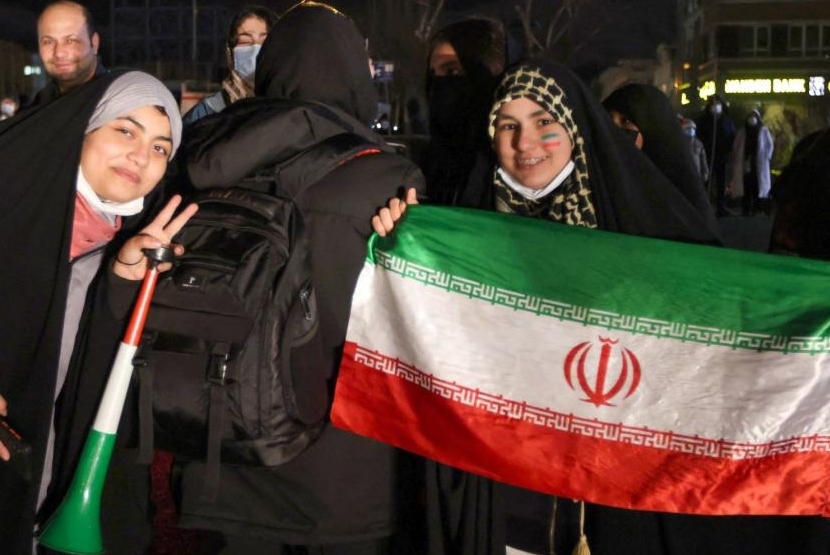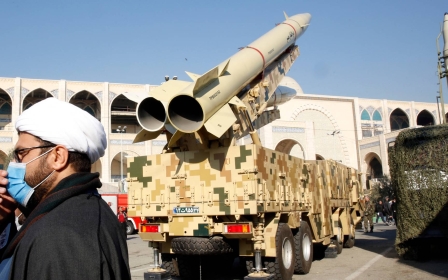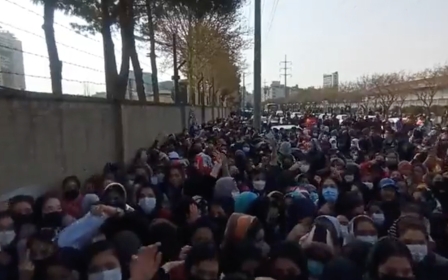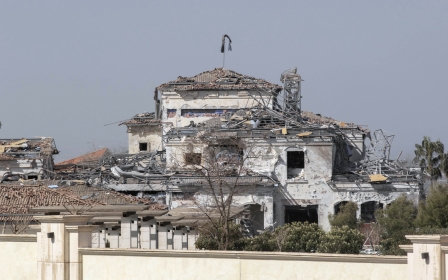Iranian press review: Anger over police attacks on female football fans

Anger as police prevent women from watching football match
A decision to ban female football fans from watching a match at Imam Reza stadium in the holy city of Mashhad has sparked anger among Iranians, who condemned a heavy handed-police response to women trying to enter the stadium.
On Tuesday, videos and photos went viral on Farsi outlets and social media showing women and girls being pepper-sprayed as they attempted to enter the stadium to watch Iran’s last 2022 World Cup qualifying match.
About 2,000 women had bought tickets for the match between Iran and Lebanon but were not allowed to enter the stadium.
Fatemeh Ashrafi, director of the HAMI organisation, which provides aid to Afghan refugee women, drew a parallel between the situation of women in Iran and Afghanistan, saying religious leaders in both countries had deprived women of their rights.
New MEE newsletter: Jerusalem Dispatch
Sign up to get the latest insights and analysis on Israel-Palestine, alongside Turkey Unpacked and other MEE newsletters
“A few days earlier, I spoke about Afghan girls being deprived of their rights to study because of religion. Today, I speak about Iranian women and girls deprived of their social rights because of religion,” Ashrafi wrote on Twitter.
Abbas Abdi, a prominent social analyst and a former political prisoner, also condemned the attacks and accused the authorities of duplicity by selling tickets to women but not letting them enter the stadium.
“This act means setting fire to people’s trust, and as there is no trust left, they [the authorities] don’t even care about setting the ashes of that trust on fire,” Abdi wrote on Twitter.
Nowruz car accidents spark criticism of automakers
During the first 10 days of the spring holidays, 552 people died in car accidents in Iran, which puts Iran’s traffic fatality rate at 2.3 per hour during this period, local media reported.
Every year, during the two-week Nowruz holiday, the number of car accident fatalities sharply rises, as Iranians travel all across the country.
In recent years, experts and traffic police have blamed the non-standard production of domestic car factories for the fatalities.
According to experts, domestic manufacturers do not follow the basic standards for car safety systems. For example, the airbags of most domestically produced cars in Iran do not function in accidents.
Following the recent increase in deaths, General Seyed Kamal Hadianfar, commander of Iran's traffic police, renewed criticism of car manufacturers in Iran based on his observation of casualties since the beginning of the spring holiday.
"In an accident on the Tehran-Rasht highway, a Dena Plus car was totally smashed from the front, but its airbags did not open," Tasnim news agency quoted Hadianfar as saying.
Iran's top car manufacturers are owned by the government and control all aspects of this industry, from production and pricing to quality control national marketing.
Tehran blames Riyadh talks deadlock
Iranian Foreign Minister Hossein Amir-Abdollahian said that Saudi Arabia was responsible for a deadlock in negotiations to restore ties between the two countries, the state-owned news agency IRNA reported.
Amir-Abdollahian claimed that Riyadh was not interested in having good relations with Tehran, hinting that the war in Yemen is a significant point of disagreement between the two countries.
"This is not an accurate assessment that whatever happens in Yemen is related to Iran," IRNA quoted Amir-Adollahian as saying.
'We have told the Saudis that the people of Yemen are the ones who should decide about their country'
- Hossein Amir-Abdollahian
"We have told the Saudis that the people of Yemen are the ones who should decide about their country."
Iran and Saudi Arabia have supported opposing warring factions in the eight-year-long civil war in Yemen.
In a 180-degree turn from Iran's recent stances toward the negotiations with Saudi Arabia, Amir-Abdollahian stressed that Tehran was ready to resume talks with its regional rival.
On 13 March, Iran announced that it had unilaterally suspended the fifth round of talks with Saudi Arabia because of the mass execution of 81 men in the kingdom, many of whom were from the country's Shia minority.
Since April 2021, Baghdad has hosted four rounds of direct talks between the two counties, aiming at restoring ties, which Saudi Arabia severed in 2016.
The last time the two countries' delegations met in the Iraqi capital was October.
Health experts warn over new wave of AIDS
Experts in Iran's health ministry have issued a warning over a new wave of HIV infections spreading among teenagers and high school students, IRNA news agency reported.
Elahe Shabani, an HIV expert, told IRNA that the AIDS contraction model has changed in Iran in recent years and sexually transmitted HIV infections have sharply increased. Previously, most people infected with the AIDS virus in Iran contracted it through the use of drugs.
Shabani stressed that one of the reasons for witnessing the current surge in AIDS infection through sexual contact is the authorities' ban on teaching sex education at schools. In recent years, the government also stopped such courses at universities, in an attempt to tackle low birth rates.
"Talking about sexual health is still considered a taboo in the country because some believe that explaining these topics would undermine social morality," Shabani told IRNA.
Shabani warned that exerting pressure on the official education system to remain silent about sexual health would negatively impact young people.
"If we - the parents, educational system, teachers, university professors, etc - remain silent about this topic, the youth would gain their information from other sources, which might mislead them," she said.
Due to the religious ban on out of wedlock relationships, officials in Iran deny that the AIDS virus spreads in Iran through sexual contact. Moreover, the government provides no reliable data about the number of people infected by the virus in Iran.
* Iranian press review is a digest of reports that are not independently verified as accurate by Middle East Eye
Middle East Eye delivers independent and unrivalled coverage and analysis of the Middle East, North Africa and beyond. To learn more about republishing this content and the associated fees, please fill out this form. More about MEE can be found here.





